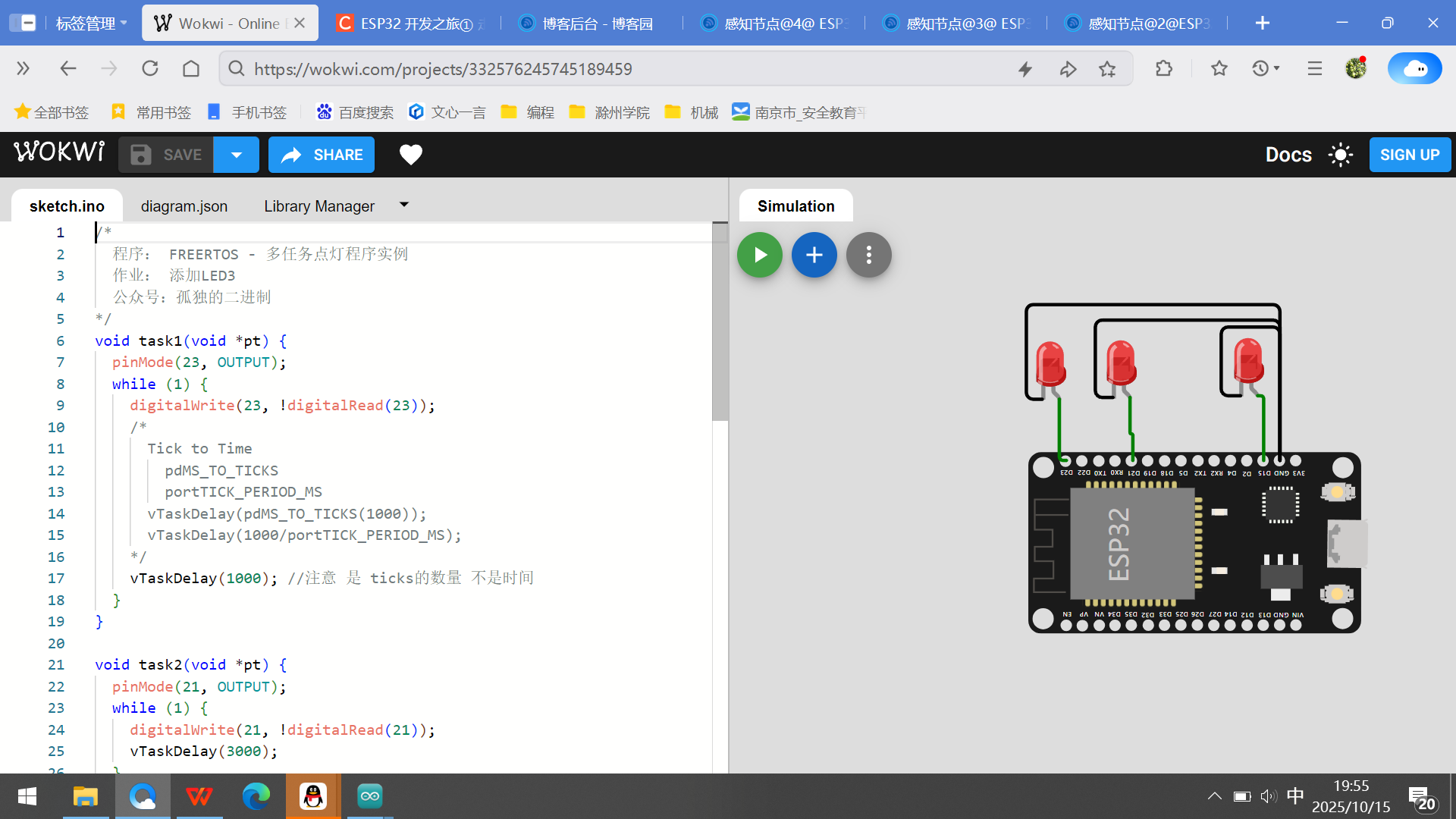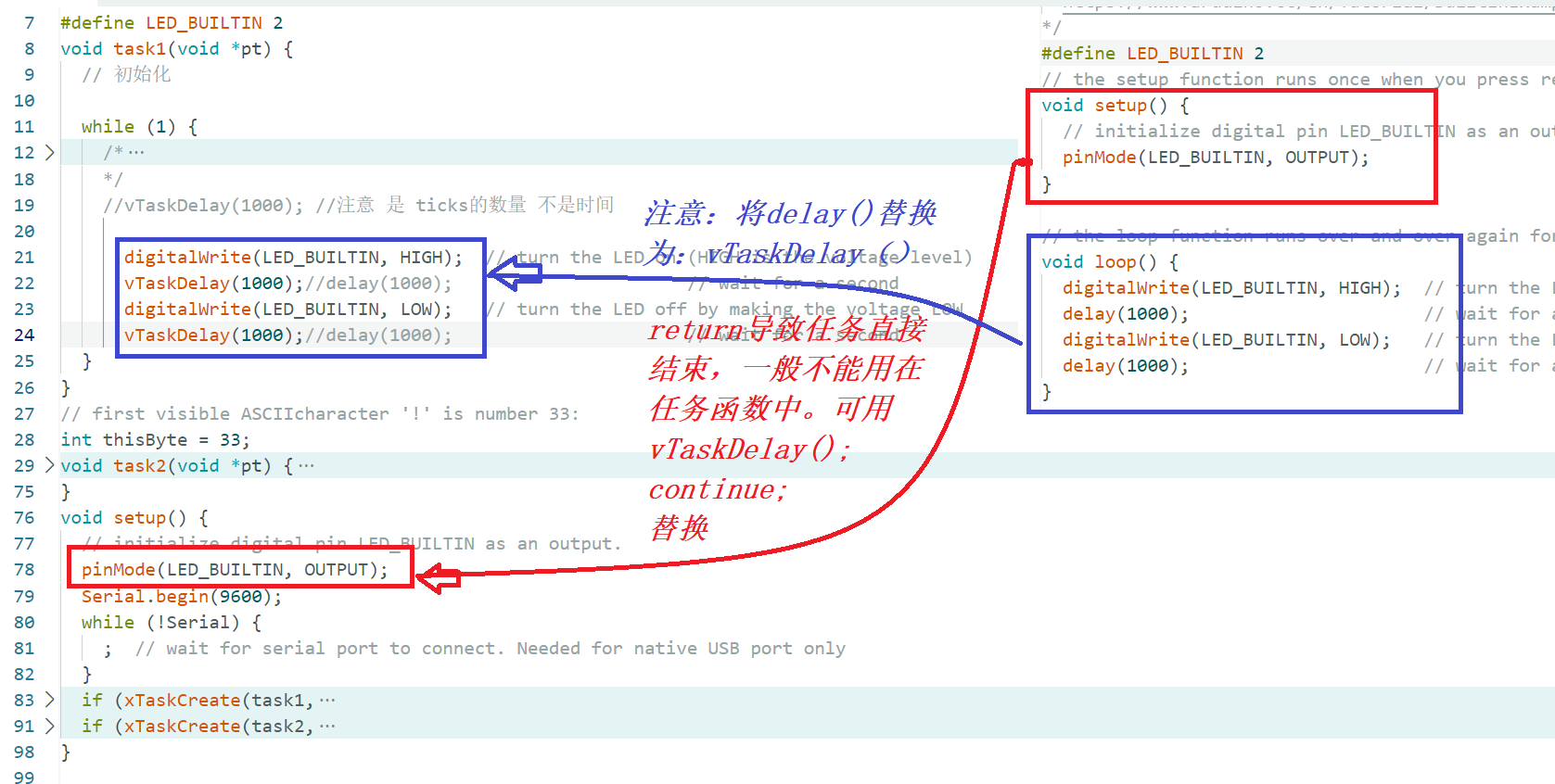感知节点@5@ ESP32+arduino+ 第三个程序FreeRTOS 上 LED灯显示 和 串口打印ASCII表
思路:
将 LED灯显示 作为 一个独立的 FreeROTS 任务
将串口打印ASCII表 作为 一个独立的 FreeROTS任务将已经调试好的 LED灯显示代码 和 串口打印ASCII表代码 复制使用,放到任务函数中。
1)观看视频,理解FreeROTS 多任务运行,复制程序实例
第二课:
https://www.bilibili.com/video/BV1RB4y1Q7be/?spm_id_from=333.1387.collection.video_card.click&vd_source=25818e6e97754951f67187083c89af5a
仿真链接:
第二课:程序实例: https://wokwi.com/projects/332576245745189459

2)复制程序实例,并修改初始化和任务函数,实现LED灯显示任务 和 串口打印ASCII表任务
举例将 第二个程序LED灯显示 整合到 FreeRTOS应用程序框架中。

/* 程序: FREERTOS - 多任务点灯程序实例 作业: 添加LED3 公众号:孤独的二进制 */ //查看电路图,那个ESP32的引脚连接LED灯 图中看到是IO2 #define LED_BUILTIN 2 void task1(void *pt) { // 初始化 while (1) { /* Tick to Time pdMS_TO_TICKS portTICK_PERIOD_MS vTaskDelay(pdMS_TO_TICKS(1000)); vTaskDelay(1000/portTICK_PERIOD_MS); */ //vTaskDelay(1000); //注意 是 ticks的数量 不是时间 digitalWrite(LED_BUILTIN, HIGH); // turn the LED on (HIGH is the voltage level) vTaskDelay(1000);//delay(1000); // wait for a second digitalWrite(LED_BUILTIN, LOW); // turn the LED off by making the voltage LOW vTaskDelay(1000);//delay(1000); // wait for a second } } // first visible ASCIIcharacter '!' is number 33: int thisByte = 33; void task2(void *pt) { //pinMode(21, OUTPUT); // prints title with ending line break Serial.println("ASCII Table ~ Character Map"); while (1) { // digitalWrite(21, !digitalRead(21)); // vTaskDelay(3000); // prints value unaltered, i.e. the raw binary version of the byte. // The Serial Monitor interprets all bytes as ASCII, so 33, the first number, // will show up as '!' Serial.write(thisByte); Serial.print(", dec: "); // prints value as string as an ASCII-encoded decimal (base 10). // Decimal is the default format for Serial.print() and Serial.println(), // so no modifier is needed: Serial.print(thisByte); // But you can declare the modifier for decimal if you want to. // this also works if you uncomment it: // Serial.print(thisByte, DEC); Serial.print(", hex: "); // prints value as string in hexadecimal (base 16): Serial.print(thisByte, HEX); Serial.print(", oct: "); // prints value as string in octal (base 8); Serial.print(thisByte, OCT); Serial.print(", bin: "); // prints value as string in binary (base 2) also prints ending line break: Serial.println(thisByte, BIN); // if printed last visible character '~' or 126, stop: if (thisByte == 126) { // you could also use if (thisByte == '~') { // This loop loops forever and does nothing while (true) { continue; } } // go on to the next character thisByte++; } } void setup() { // initialize digital pin LED_BUILTIN as an output. pinMode(LED_BUILTIN, OUTPUT); Serial.begin(9600); while (!Serial) { ; // wait for serial port to connect. Needed for native USB port only } if (xTaskCreate(task1, "Blink", 1024, NULL, 1, NULL) == pdPASS) Serial.println("Task1 Created."); if (xTaskCreate(task2, "ASCII_table", 1024, NULL, 1, NULL) == pdPASS) Serial.println("Task2 Created."); } void loop() { }
3)下载运行代码。观察是否串口打印ASCII表 ,LED闪烁
总结:
可以使用 FreeRTOS将模块程序结成为一个更复杂的系统程序。实现积木式开发。




 浙公网安备 33010602011771号
浙公网安备 33010602011771号